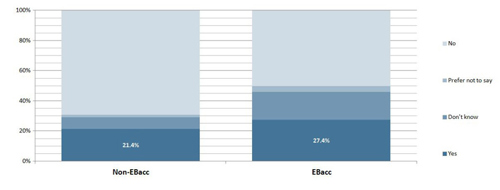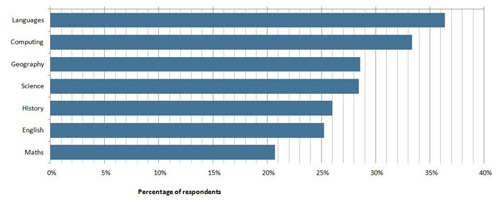EBacc teacher recruitment and retention: even more challenging times ahead?
Thursday 4 February 2016
Secondary schools face particular teacher recruitment and retention challenges, especially in some English Baccalaureate (EBacc) subjects. This was one of the conclusions of NFER’s report last November, Should I Stay or Should I Go: NFER Analysis of Teachers Joining and Leaving the Profession. The report was well received, primarily for its fresh and independent take on the emotive topic of a so-called workforce crisis.
Results from our November Teacher Voice survey are now in and further illustrate the increasing challenge schools are potentially facing. Focusing just on secondary schools, we find that a significantly higher proportion of EBacc teachers are considering leaving the profession compared to non-EBacc teachers. One of the conclusions of our original report was that there’s an important difference between intent to leave and the reality (around 10 per cent of teachers actually leave the profession each year), but the latest survey results are concerning nevertheless.
Are you considering leaving teaching within the next 12 months?

Source: NFER Teacher Voice, November 2015 Secondary school teachers classified according to whether they teach at least one EBacc subject (497 respondents) or not (182 respondents)
Our findings are particularly timely, with the government consultation on the EBacc having recently closed on 29 January. With 2,759 responses received, this makes it one of the most popular consultation topics of the past year (second only to the consultation on teacher workload). One of the issues considered was how the introduction of the EBacc relates to teacher recruitment and retention, whether there are enough teachers to teach the EBacc subjects, and how the introduction of the EBacc will affect teachers in non-EBacc subjects.
Drilling further down into our survey results, we find that there is some variation between EBacc subjects. When it comes to numbers considering leaving teaching in the next 12 months, maths and English fare relatively well, with 21 and 25 per cent respectively. Even these figures seem high, but for languages and computing our survey suggests the challenges are still greater, with 36 and 33 per cent respectively considering leaving.
Are you considering leaving teaching in the next 12 months?

Source: NFER Teacher Voice, November 2015 Total number of respondents by subject: Languages 55, Computing 45, Geography 56, Science 123, History 50, English 95, Maths 95
If this pattern is replicated in the proportion of teachers actually leaving the profession, this has the potential to place further pressure on the teaching workforce at a time when the EBacc, and rising pupil numbers, are both increasing the need for teachers in these subjects. Importantly you only need a shortage in one EBacc subject for the entire EBacc to be at risk.
The challenge becomes even more acute when you consider the numbers of teachers joining the profession. Computing and languages not only appear to have the greatest numbers considering leaving teaching, but these subjects also have some of the greatest shortfalls in new teachers being recruited (just 70 and 87 percent of the target, according to provisional figures for 2015/16).
This is of course just a snapshot in time and we have yet to see how intentions may be affected as the influence of the EBacc begins to take effect over the next couple of years. We will be repeating our survey questions again this Spring, when we’ll also include further analysis of the link between teachers’ working lives and their intentions to leave. This will provide a timely update on subject shortages and the fate of the EBacc. It will also offer valuable evidence on this most urgent of questions: what strategies will be most effective in keeping our teachers teaching?
